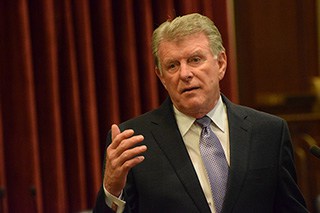


Gov. Butch Otter told reporters Thursday that the Idaho Freedom Foundation has a “hate book,” and that legislators followed it to bring his biggest defeat of the 2018 legislative session. If Ottercare’s demise was inspired by a book, its contents are most definitely not inspired by hate. Moreover, its contents shouldn’t be foreign to a governor who claims to practice conservative principles.
The governor told reporters, “A lot of the bullet points [used to defeat Ottercare] came right out of the Freedom Foundation’s hate book. It was things like, ‘We’re expanding Medicaid,’ ‘We’re growing government,’ ‘We’re making people dependent on government.’” He followed that diatribe with a nudge to have state government officials investigate IFF for lobbying against his bill, falsely asserting we had done so illegally. It’s possible Otter meant to say “playbook,” but Otter isn’t stupid. I think he chose his words carefully.
The truth is, Otter was given every opportunity to avoid this year’s big battle over the failed Medicaid expansion, and to address the issue in a way mindful of limited government principles. Further, last fall, I called Butch and asked if he’d be OK with us working with his agencies to hash out a compromise. Otter agreed, although, as I recall, not enthusiastically. My goal was to have a greater number of people leave government-run healthcare than Otter planned to add.
The negotiations didn’t last long. IFF offered a dozen suggestions that ultimately would have: reduced the number of people on government healthcare programs, improved the delivery of services under the existing Medicaid system, and saved taxpayer money.
Otter’s agencies rejected every single proposal my team offered. They provided a litany of lame excuses for why none of our reform recommendations would work. There was no attempt to compromise, no attempt to reach a middle ground. We wanted to reduce reliance on government. Otter clearly didn’t.
IFF does have a playbook, and Otter should know it contains an essay called “The Proper Role of Government,” written by Ezra Taft Benson. Why should Otter know of this essay? Because he has cited it often during his many years in office. It’s an essay that a mutual friend and mentor, Ralph Smeed, regularly reprinted with Otter’s face on the cover with the then-congressman’s introductory remarks.
In his essay, Benson urges thoughtful deliberation as concerns the limits to government: “Do I as an individual have a right to use force upon my neighbor to accomplish [a] goal? If I do have such a right, then I may delegate that power to my government to exercise on my behalf. If I do not have that right as an individual, then I cannot delegate it to government, and I cannot ask my government to perform the act for me.”
Benson continues, “To be sure, there are times when this principle of the proper role of government is most annoying and inconvenient. If I could only FORCE the ignorant to provide for themselves, or the selfish to be generous with their wealth! But if we permit government to manufacture its own authority out of thin air, and to create self-proclaimed powers not delegated to it by the people, then the creature exceeds the creator and becomes master.”
Benson drew inspiration from the French author Frédéric Bastiat, who warned in his influential work, “The Law,” that government shouldn’t be used to take from those who have to give to those who do not have.
Bastiat wrote, “The mission of the law is not to oppress persons and plunder them of their property, even though the law may be acting in a philanthropic spirit. Its mission is to protect persons and property.”
All of this, Otter should know.
For the last year, I’ve joked that Otter has been replaced by an alien doppelganger, that the Otter we once knew and loved is in a spaceship bound for a galaxy far, far away. Whether or not that is true, I hope that the Otter who is in Boise, who remains in power for several more months, will take some time to re-read liberty-minded writings as he concludes his days as governor.
If he did, he would learn—perhaps again, perhaps for the first time—the perils of socialism and the virtues of free markets and free people. He would learn that a politician, who uses the law to steal money from people who have earned it, is not committing an act of love. A politician who forces people onto failing government programs so that society doesn’t have to think of them is not caring. And, finally, Butch should know, it is not hateful to use free-market solutions to successfully address the health concerns of the needy.


